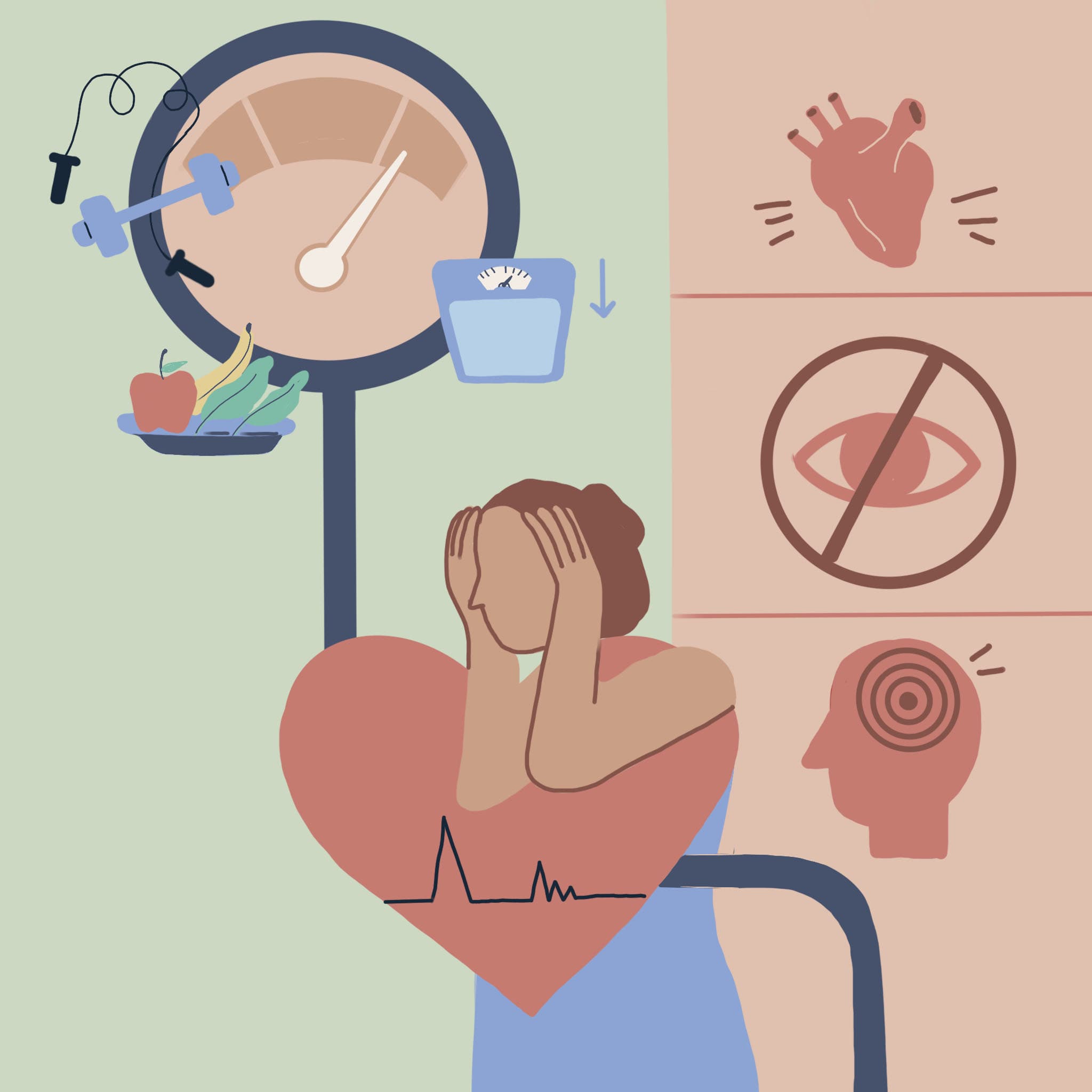This article is compiled by Sanjana Varma, a freelance writer at Proactive For Her.
What is high blood pressure?
High blood pressure is caused by excessive force on the walls of the blood vessels due to the blood flow within them. This makes the heart work harder and puts more strain on the blood vessels. It may lead to heart disease, stroke and other serious conditions. Healthcare professionals call In medical terminology, high blood pressure is referred to as 'hypertension'. The ideal blood pressure range is 120/80 mm Hg. The upper figure (called the systolic level) is a measure of the pressure inside your arteries when your heart is pumping blood out. The lower figure (called the diastolic level) is a measure of the pressure inside your arteries when your heart is resting between beats. If your BP reading is 140/90 mm Hg or above, usually this is defined as hypertension. However, before diagnosing hypertension, you would require consecutive high BP readings. Your blood pressure varies naturally throughout the day. It may be high for a short time if you are anxious, stressed, or have just been exercising.
What are the symptoms of high blood pressure?
The majority of people with high blood pressure are asymptomatic at first. They become aware after a complication such as a stroke or heart attack. If you go for routine blood checks, you might be able to diagnose early.
The symptoms for hypertension can include:
- headaches
- dizziness
- visibility issues
Why is high blood pressure a problem?
High blood pressure (hypertension) is a risk factor for developing serious health problems in the future. It will impact your blood vessels and heart. The higher the blood pressure, the higher your risk for diseases of the heart and blood vessels. Cardiovascular disease is the biggest risk from having high blood pressure. Cardiovascular diseases refer to diseases of the heart (cardiac muscle) or blood vessels (vasculature). This usually leads to Poorly managed hypertension can also lead to atheroma (blood clot) causing deposition of fat lumps inside the lining of your arteries leading to hardening of the arteries.
Some of the major complications of hypertension include:
- Angina ( chest discomfort or shortness of breath due to insufficient amount of oxygen to your heart muscle)
- Heart attack
- Stroke ( blood supply being cut off to a portion of your brain)
- Transient ischaemic attack (TIA) (a stroke- like attack that resolves within 24 hrs)
- Peripheral arterial disease ( narrowing of arteries of the limbs)
- Poor kidney function leading to dialysis
- Poor vision (Effect on retina in the eye)
In women, hypertension can complicate pregnancies, it might be fatal for both the mother and the child. Increased blood pressure in pregnancy could complicate preeclampsia. It's more commonly seen in the later half of pregnancies.Sudden weight gain, swelling of the feet, headache and poor vision are some symptoms of preeclampsia. Women may also experience liver and kidney issues. It might lead to preeclampsia. It usually develops after 20 weeks of pregnancy. Along with high blood pressure, pregnant women can experience headaches, liver or kidney problems, and sometimes sudden weight gain and swelling.
Who is at risk?
High blood pressure is more common in people:
- with diabetes ( both Type 1 and Type 2)
- of African-Caribbean/Indian origin
- with a family history of high blood pressure.
- who are overweight.
- who have excess salt in their diet
- who lead sedentary lives
- who are alcoholic
- who lead stressful lives
The red flags you need to look out for
Usually, people with hypertension do not have any symptoms. The diagnosis of hypertension is often picked up at a routine check up. Nevertheless, the following are the alarming symptoms which can occur in some individuals.
- headache
- fatigue/confusion
- nose bleed
- weakness of limbs/stroke symptoms
- poor vision problems
- chest pain
- dizziness
- an irregular heartbeats
- difficulty breathing
- pounding in the chest or ears
If you experience any of these signs, don’t hesitate to seek treatment.
What can you do to help?
Take your prescribed medications regularly. Medicines along with lifestyle changes can help in reducing hypertension. Some ways to curb hypertension are:
- Lose excess weight – Extra kilos is a faster route towards hypertension, diabetes and even cancer. Seek the help of a nutritionist/dietician to reach a healthy body weight.
- Healthy eating- Eating a diet that is rich in whole grains, fruits, vegetables and low-fat dairy products and low in saturated fat and cholesterol can lower your blood pressure
- Exercise regularly – Make it a habit to exercise for 30 to 60 mins a day of exercise. You don’t need to slough at gyms alone, choose a workout that excites you and prompts you to do it every day. Exercise can help to make your body fit and your mind healthy.
- Strictly watch your salt intake – Sodium, a mineral added to foods to boost taste and prevent spoilage, can lead to hypertension if consumed in excessive amounts. It is present in your salt as well. Avoid or cut back products with high salt content like chips, pickles and savoury snacks.
- Cut down on alcohol – Unhealthy amounts of drinking can cause liver problems and hypertension. You should limit the number of drinks you consume. Instead of drinking daily, try to make it once a month (in healthy amounts) or once in two or three months.
- Stop smoking- The nicotine in cigarettes and other tobacco products make your blood vessels narrow and your heart beat faster, which makes your blood pressure get higher.
- Manage your stress levels – Stress is a major trigger for hypertension. A little bit of stress is healthy, but when it consumes your whole it is another matter. Engage in activities like yoga, therapy or mindfulness to get some peace. Spend time with your loved ones, cultivate a hobby or sleep your stress off. Don’t let stress control you.
Bottom Line
Hypertension is a chronic (lifelong) condition and can lead to devastating consequences such as stroke. You should never slack on your medication or healthy lifestyle changes. Make sure you go for annual check-ups with your doctor. If you were never diagnosed with hypertension and you experience any of the symptoms, call your doctor and follow their advice. Set aside your worries, you can get your health back on track!
Disclaimer - This information is provided for educational purposes and should not be construed as medical advice. Please consult with your healthcare practitioners before undertaking any changes in your diet or adding supplements.
Proactive is a digital clinic for women, offering accessible, personalized, and confidential healthcare solutions. We offer products and services for out-patient health concerns of Indian women, across their lifetime - from puberty to pregnancy to menopause. To know more on the sexual and reproductive health of women, visit https://www.proactiveforher.com/

